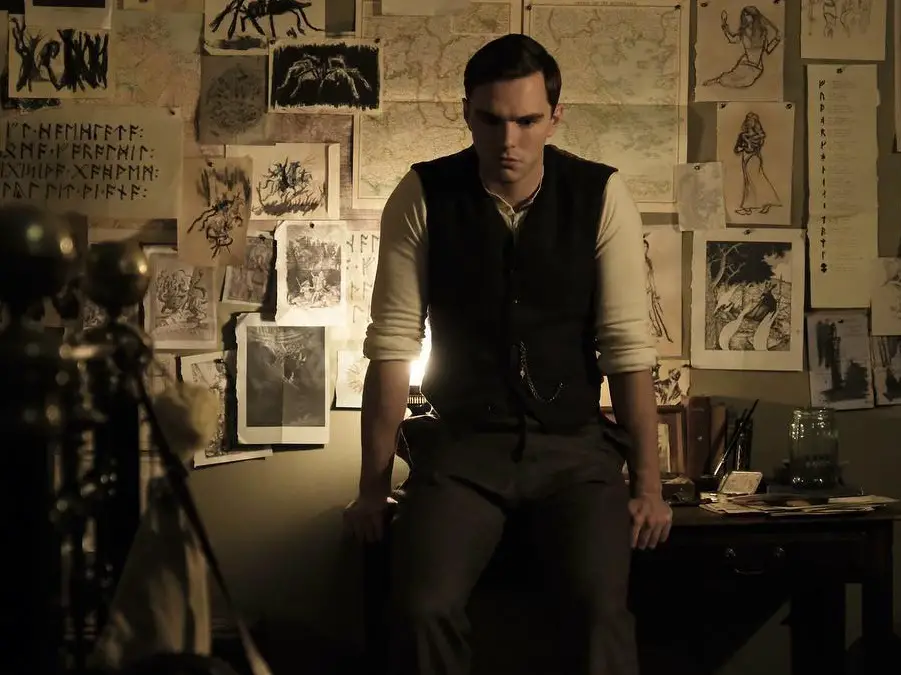“Tolkien,” starring Nicholas Hoult as J.R.R. Tolkien, traces the beloved author’s formative influences and is full of friendship, romance and literary references. The film’s conflict is split between the battlefield and Birmingham, England. Fantasy, as a genre, directs a viewer’s gaze to mystical matters, because its primary concerns are otherworldly people, activities and destinations. However, the genre’s best members address reality, as well. Lloyd Alexander, revered author and winner of the John Newberry Medal, once remarked, “Fantasy is hardly an escape from reality. It’s a way of understanding it.”
The biopic opens with a medieval war scene, or, at least, the conflict at hand resembles an ancient battle, as two horsemen gallop towards one another, swords drawn. The surrounding land is aflame and filled with dying soldiers. One rider wears white, while his enemy is clothed in black; a deadly collision seems inevitable.
Suddenly, however, the scene disappears, and Tolkien, a young, sickly-looking army captain in the trenches of World War I, awakens from his dream with a gasp. Squalor and death surround him, but nonetheless, he embarks on a mission to rescue a missing childhood friend. A plucky cadet accompanies Tolkien, and together, they stumble through the trenches, dodging bombs and bodies at every turn. Distraught and feverish, Tolkien ponders the magic-filled days of his childhood.
At first glance, Tolkien’s past resembles a tragedy. Throughout his early life, it seems difficult to see happiness, much less magic. Tolkien, at 12 years old, is orphaned, and a priest, assuming responsibility for the precocious boy, places him in a boarding house. Mrs. Faulkner, the house’s matron, is not thrilled with her new occupant, but despite the grim circumstances, Tolkien finds happiness in his new surroundings.
At school, he befriends fellow creatives Robert Gilson, Christopher Wiseman and Geoffrey Bach Smith. They discuss their artistic and intellectual interests, including painting, music, poetry and linguistics. Elsewhere, Tolkien makes another friend: Edith Bratt, portrayed by Lily Collins, is a fellow boarding house resident. Within the confines of its walls, she pursues her passion for music.
As Tolkien and Bratt fall in love, Tolkien’s tragic past disappears from memory, and his intimate relationships and fulfilling intellectual life produce a special kind of magic. But with World War I looming on the horizon, the impending, brutal climax of Tolkien’s life soon threatens to shatter his mesmerizing routine.
Occasionally, the movie’s underlying structure threatens to shatter the magic, and, at times, the dialogue is riddled with clichés. Tolkien’s conversations with his schoolmates are endearing, but their boisterous rants play into the overused trope of the tortured artist. As the four rail against their supposed oppressors, they drink expensive whiskey and wear immaculate clothing, enjoying all the benefits of wealth as their superior education equips them with the tools to solve their problems, and they spend more time complaining than taking any constructive action.
Additionally, “Tolkien” attempts to tackle expansive material in a short time, and ends up glossing over key events; for example, Tolkien never fully grieves his mother’s death, and Tolkien’s little brother, ever-present at first, disappears as the plot progresses. At times, such structural carelessness threatens the movie’s magical elements.
These instances aside, however, “Tolkien” communicates the value of literature with elegant expertise. Tolkien’s literary studies transform his vision in a positive way, and his intellectual pursuits paint the world with new colors. He begins to see the dragons of ancient stories within everyday life, swooping across his bedroom walls. Tolkien never fights a German soldier; rather, a fiery dragon rises from the desolate battlefield and looms over him, threatening to consume his body in flames. Obviously, Tolkien’s literary interests are far from stuffy or boring, and books lend both beautiful and heart-pounding novelty to his experiences.
In fact, the characters in “Tolkien” all see words as carriers of emotion. They quote Chaucer with gusto and treasure poems as beautiful commodities. Tolkien’s fascination with linguistics constantly surfaces, and he invents new languages, simply for the pleasure of playing with original words. In a memorable scene, Tolkien and Bratt contemplate the dual elements of words, where meaning and sound contribute to a word’s overall beauty. Without excellence in each area, a word remains mediocre, but if both factors are present, a beautiful expressive tool is born.
Throughout “Tolkien,” the characters place special value on ancient words; the priest, while counseling his friends, says that old words have the power to bring peace. Amid modern chaos, like the barbarism of World War I, modern words often fall on deaf ears. Ancient stories, however, can address contemporary problems, because their distance ensures a fresh perspective on difficulties.
Oftentimes, audiences perceive fantasy as escapist literature because, after all, the genre’s content seems far away from today’s issues. “Tolkien” presents a case for ancient fantasy’s relevance in modern life. Stephen King, echoing the movie’s argument, once said, “Fantasy has a better chance of lasting than a lot of other things. ‘The Hobbit’ and ‘Narnia’ books, they seem to get handed down father to son, mother to daughter. Because they’re set in a fantasy world, they can remain relevant.”
Fantasy remains relevant throughout Tolkien’s entire life, as ancient, otherworldly words mold him into an excellent author. But they produce more than skillful writing; Tolkien’s passions create intimate relationships, and his interests form a bridge between himself and likeminded peers. While on the surface they seem unlikely initiators of change, tattered old books can create dynamic friendships.
Overall, fans of Tolkien’s work will enjoy the new historical biopic; die-hard “Lord of the Rings” nerds will have fun tracing the film’s references, both subtle and obvious, while heartwarming friendships and romance appeal to a wider audience — and “Tolkien” even grants action-lovers a few intense war scenes.
The film’s greatest strength, however, is an unashamed concentration on language. Its occasional blunders aside, “Tolkien” vividly captures the author’s three intellectual loves: ancient literature, fantasy and linguistics. His adoration of words makes “Tolkien” a reverent love letter to language.
















